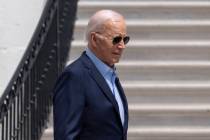Oil companies win big with energy bill vote
WASHINGTON — Oil companies won a major victory last week when the Senate fell one vote short of advancing legislation to spur the development of alternative energy sources.
Democratic leaders sought to eliminate $9.4 billion in tax breaks for the oil industry over the next 10 years and use that money to provide more tax credits for wind, solar and other renewable energy companies.
President Bush vowed to veto the comprehensive energy bill that included the tax provision.
The Senate voted 59-40 to leave the tax provision in the bill, but 60 votes were needed to prevent a filibuster.
Sen. Harry Reid, D-Nev., voted for the alternative energy tax provision.
Sen. John Ensign, R-Nev., voted against it.
After failing to get enough votes for the alternative energy tax provision, Democratic leaders removed it from the energy bill. The Senate went on to pass the bill by a vote of 86-8.
The measure would raise fuel-efficiency standards for cars and light trucks to 35 miles per gallon by 2020.
The bill also requires more use of corn-based ethanol and fuel from farm wastes to reduce the nation’s dependence on foreign oil by about 36 billion gallons by 2022.
Ensign and Reid voted for the energy bill.
INTERROGATION RESTRICTIONS
Defying another veto threat from Bush, the House voted 222-199 to outlaw waterboarding and other interrogation methods which could be considered torture against prisoners from al-Qaida.
The bill would require compliance with the Army Field Manual, which forbids physical force in interrogations.
Bush said a ban on harsh interrogations would prevent the protection of Americans during wartime.
Rep. Shelley Berkley, D-Nev., voted to restrict interrogation methods.
Rep. Jon Porter, R-Nev., voted against restricting interrogation methods.
Rep. Dean Heller, R-Nev., did not vote.
AMT DIMINISHED
The House voted 226-193 to spend $55.7 billion to protect millions of middle-class taxpayers from the alternative minimum tax.
Enacted in 1969 to prevent the rich from avoiding taxes, the alternative minimum tax was not indexed for inflation and now covers families with incomes as low as $50,000.
The spending in the House bill would come, in part, from tax increases on hedge fund managers who defer pay in offshore accounts.
Republicans argued that tax relief should not be extended to some people by taxing others, and Bush has threatened to veto the bill.
Berkley voted for the bill.
Heller and Porter voted against it.
CHILDREN’S HEALTH VOTE DELAY
Following Bush’s veto of a bill to increase spending by $35 billion on the State Children’s Health Insurance Program, the House voted 211-180 to postpone an override vote until Jan. 23.
House Speaker Nancy Pelosi, D-Calif., requested the delay because Congress is trying to wrap up other business before Christmas.
In October, the House failed to override a previous veto of virtually the same bill.
Advocates of the House bill said it would increase the children’s health insurance program’s budget to $60 billion over the next five years and cover 10 million children.
Bush and other critics said the cost is too high and would cover children of illegal immigrants as well as children who are not poor.
Berkley voted to postpone the override vote.
Heller and Porter voted against postponing the vote.


















